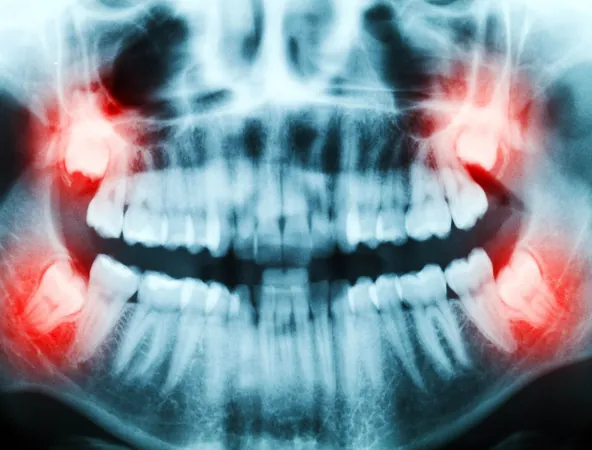
Unlocking the Hidden Treasure in Your Wisdom Teeth: Stem Cells That Could Change Medicine
2025-06-28
Author: Jia
The Surprising Potential of Wisdom Teeth
Millions of Americans undergo wisdom tooth removal each year, typically viewing these third molars as mere dental nuisances. But what if these so-called 'biological clutter' actually contained a treasure trove of medical possibilities? Recent research suggests that stem cells found in wisdom teeth could be pivotal in combating several serious diseases.
Dental Stem Cells: The Goldmine Hidden in Your Mouth
Imagine turning your routine dental visit into the first step in a personalized healthcare journey! According to a study led by Dr. Gaskon Ibarretxe at the University of the Basque Country, wisdom teeth harbor dental pulp filled with valuable stem cells capable of regenerating bone, cartilage, and nerve tissue.
Harnessing the Power of Dental Pulp
Inside each wisdom tooth lies the dental pulp, a soft core that keeps the tooth alive. Researchers have discovered that these pulp-resident cells can transform into various cell types—including neurons and heart muscle—when stimulated in the lab. This transformation is not just theoretical; Ibarretxe's team has successfully made these cells mimic the functional behavior of neurons, crucial for treating brain injuries and disorders.
The Case for Saving Wisdom Teeth
Approximately 10 million wisdom teeth are extracted in the United States annually, with most ending up in biomedical waste bins. However, every extracted tooth could provide a painless source of living tissue that could be processed and preserved for medical use. Dental clinics are now partnering with labs to store these vital cells, offering services like Stemodontics—dubbed 'biological insurance' for future health needs.
Breaking Through Ethical Barriers
Unlike embryonic stem cells, collecting dental pulp is devoid of ethical controversy, as the tissue would typically be discarded. This positions dental stem cells as a practical and accessible option for expanding personalized regenerative therapies, particularly as banking costs decrease.
Fighting Diseases with Dental Stem Cells
Preclinical studies reveal that dental pulp stem cells can alleviate symptoms of Parkinson's disease in animal models by replacing lost dopamine-producing neurons. In the context of Alzheimer's research, these cells show promise by secreting growth factors that protect brain synapses and may slow toxic protein buildup. With ongoing clinical trials, dental stem cells might soon rival embryonic cells in treating neurological disorders.
Creating Your Own Biobank
Banking your dental stem cells means reduced risk of immune rejection and a faster treatment timeline. The extraction process is streamlined: your dentist places each tooth in a sterile vial, and within 24 hours, the stem cells can be isolated and preserved for future therapies.
Broad Applications Beyond Neurology
The applications of dental stem cells extend beyond brain health. They can promote faster repair of bone tissue, showing potential for jaw repair after tumor surgeries. Cardiologists are already testing dental pulp secretions in heart failure models, hinting at the possibility of developing cardiac patches from a patient's own wisdom teeth.
A Future of Breakthrough Therapies
While more safety data is needed, the ongoing research may lead to multicenter trials to evaluate the efficacy of pulp cell implants for treating movement disorders. If proven effective, this could revolutionize standard treatments and make wisdom tooth banking a routine recommendation from dentists.
Consider the Treasure Before Tossing Your Teeth
As we look to the future of medicine, wisdom teeth might just be the unexpected key to breakthroughs in treating diseases like Alzheimer’s and spinal cord injuries. So the next time you’re faced with extracting a tooth, remember: hidden within that tooth could be the regenerative gold you never knew you had.

 Brasil (PT)
Brasil (PT)
 Canada (EN)
Canada (EN)
 Chile (ES)
Chile (ES)
 Česko (CS)
Česko (CS)
 대한민국 (KO)
대한민국 (KO)
 España (ES)
España (ES)
 France (FR)
France (FR)
 Hong Kong (EN)
Hong Kong (EN)
 Italia (IT)
Italia (IT)
 日本 (JA)
日本 (JA)
 Magyarország (HU)
Magyarország (HU)
 Norge (NO)
Norge (NO)
 Polska (PL)
Polska (PL)
 Schweiz (DE)
Schweiz (DE)
 Singapore (EN)
Singapore (EN)
 Sverige (SV)
Sverige (SV)
 Suomi (FI)
Suomi (FI)
 Türkiye (TR)
Türkiye (TR)
 الإمارات العربية المتحدة (AR)
الإمارات العربية المتحدة (AR)